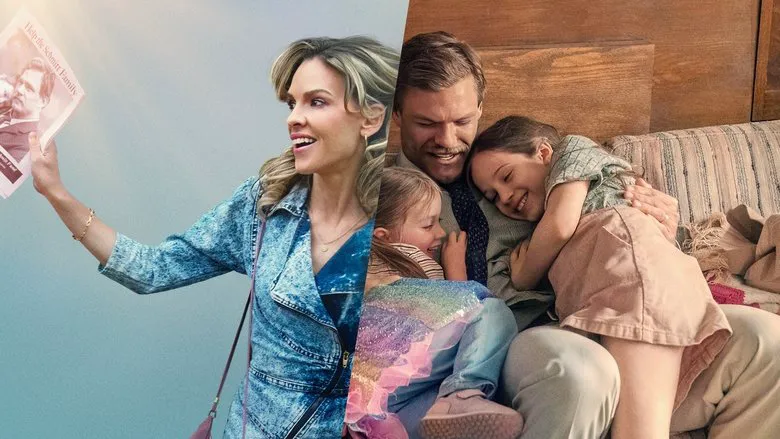Ordinary Angels: A Heartfelt Journey of Faith and Humanity
“Ordinary Angels,” featuring Hilary Swank and Alan Ritchson, is more than just a faith-based drama; it’s an exploration of human connection and the power of community. Produced by Andrew and Jon Erwin, the duo behind impactful films like “I Still Believe” and “Jesus Revolution,” this movie subtly weaves in themes of faith while focusing on the inspiring story of a young girl desperately awaiting a life-saving liver transplant. The film strives to connect with a broad audience, delivering a message of hope and resilience.
 Alt: Hilary Swank as Sharon in “Ordinary Angels”
Alt: Hilary Swank as Sharon in “Ordinary Angels”
The Erwin brothers, openly driven by their Christian beliefs, have consistently sought to use cinema as a vehicle for spreading their message. Their Kingdom Story Company has become a significant force within the “faith-based” genre, known for producing films that resonate with Christian audiences.
From Overt to Subtle: The Evolution of Faith-Based Storytelling
Interestingly, the Erwin brothers’ success has allowed them to venture into more secular territories with their productions. This might be a strategic move to reach individuals who aren’t actively seeking faith-based content. However, the contrast between their earlier, more direct works, such as the anti-abortion drama “October Baby,” and a film like “Ordinary Angels” is quite noticeable. “Ordinary Angels,” co-written by the writers of “The Big Chill” and “The Edge of Seventeen,” benefits greatly from Hilary Swank’s compelling performance.
In “Ordinary Angels,” the presence of God is less of a commanding force and more of a subtle influence, a silent observer. The church plays its part in the story of the dying girl, but its doctrines are primarily expressed through the actions and compassion of the community. While the protagonist’s faith wavers and is eventually restored through what could be seen as miraculous events, the film implies that these “miracles” are born from the kindness and determination of ordinary people, rather than solely through divine intervention.
A Nuanced Approach to Spirituality
Unlike the Erwin brothers’ biographical films, which often feature a pivotal, overtly religious shift in their final act, “Ordinary Angels,” skillfully directed by Jon Gunn (“The Case for Christ”), exhibits a consistent and balanced tone throughout. The film trusts that its core audience will recognize the underlying themes of faith and devotion, even if the central message revolves around the critical importance of organ donation and human empathy.
 Alt: Alan Ritchson as Ed in “Ordinary Angels”
Alt: Alan Ritchson as Ed in “Ordinary Angels”
If it weren’t for the noticeable absence of humor, irony, or blatant political statements, “Ordinary Angels” could effortlessly blend in with mainstream dramas. Make no mistake, it is a faith-based film, but it places its faith in humanity’s capacity for good rather than solely in a higher power. This doesn’t automatically make it a cinematic masterpiece, but it undeniably offers a refreshing and thought-provoking perspective.
The Harsh Realities of Healthcare and the Power of One
Perhaps “Ordinary Angels” strikes a chord with both religious and non-religious viewers because it fearlessly addresses a universally relatable struggle: navigating the complexities and often overwhelming challenges of the American healthcare system. Set in the late 1980s, the story introduces us to Ed Schmitt (Alan Ritchson), who joyfully witnesses his wife giving birth to their daughter Michelle. Tragedy strikes five years later when Ed’s wife passes away, leaving him as the sole caregiver for their two young daughters.
A Father’s Unyielding Resolve in the Face of Despair
However, because this is an inspirational piece of Christian storytelling, Ed’s suffering cannot simply end there. Young Michelle (Emily Mitchell) is diagnosed with biliary atresia, a severe condition that necessitates a liver transplant for her survival. Ed, already financially burdened by his wife’s extensive medical expenses, is confronted with the daunting and seemingly insurmountable prospect of affording yet another life-saving, but extremely costly, medical procedure.
Sharon’s Unwavering Intervention: A Catalyst for Change
Enter Sharon Stevens (Hilary Swank), a tenacious and compassionate hairdresser who stumbles upon Ed’s heartbreaking story in the local newspaper. Moved by his plight, Sharon decides to dedicate herself wholeheartedly to saving him and his daughter. Sharon is portrayed as a flawed character, grappling with her own personal demons, but she emerges as an unwavering force, relentlessly pushing the Schmitt family to overcome every obstacle placed in their path.
While Ed wrestles with his faith, questioning God’s plan amidst the turmoil, Sharon tirelessly dedicates herself to finding solutions for Michelle. She organizes fundraising events, confronts hospital administrators, and firmly believes that even the most rigid bureaucratic systems can be swayed by the determination and compassion of individuals.
 Alt: Sharon and Ed working together in “Ordinary Angels”
Alt: Sharon and Ed working together in “Ordinary Angels”
The Profound Impact of Human Connection and Unconditional Support
Sharon’s unwavering efforts are fueled by a deep-seated desire to mend her strained relationship with her own son. Her friends suggest that her obsessive focus on helping the Schmitts is simply a form of addiction, albeit an addiction with the potential to positively impact the world. After all, who else could persuade a hospital administrator to forgive a staggering $400,000 in medical debt?
The film crescendos in a dramatic race against time, as the community unites in a collective effort to transport Michelle to a hospital in Omaha for her crucial transplant. While certain aspects of the story may be embellished for dramatic effect, Swank’s portrayal of Sharon’s desperation and unwavering commitment is believable enough to forgive the film’s narrative liberties.
A Heartwarming Narrative with a Powerful Message: Celebrating the Extraordinary in the Ordinary
“Ordinary Angels” is, at its core, a feel-good story that explores the themes of finding faith in unexpected places and having the drive to share those experiences with a wider audience. While some viewers may interpret the film’s nuanced approach to religion as another form of pious sentimentality, it ultimately suggests that even the most troubled individuals can be seen as evidence of God’s presence, and even the most senseless tragedies can be interpreted as being part of a larger, incomprehensible plan.